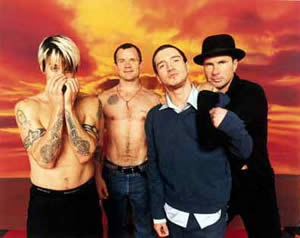Few rock groups of the ’80s broke down as many musical barriers and were as original as the Red Hot Chili Peppers. Creating a new musical style by combining funk and punk rock together, the Chili Peppers spawned a flurry of imitators in their wake but still managed to be the leaders of the pack by the dawn of the 21st century. Let’s not forget their on-stage antics, such as wearing socks on stage……, not on their feet.
Intro Riff
This riff requires a capo to play on the 2nd fret, or you can just bare the 2nd fret with your first finger (a little bit harder). Every guitar player should have a capo in their toolbox. It’s a device that you clamp onto your guitar to clamp the strings down. In this instance, we’re capoing the 2nd fret. This will automatically transpose everything up a whole step so that the open strings are the notes on the 2nd fret of the guitar. Therefore, the notes on the 2nd fret in the transcription are played as open strings. All other notes are relative to the capo. As I said, it is possible to play this without a capo by fingering the notes on the 2nd fret, or you could transpose it down a whole step and play everything 2 frets down so that the notes
on the 2nd fret are the open strings.


Here’s what it sounds like at the normal tempo of 69 bpm:
Now, let’s break it down into 2 parts. Isolate and practice each part separately. Below is the easier of the two. With the capo on the 2nd fret, you may notice the familiar C and E chord shapes.

Here is the 1st part looped at slower tempo for you to practice:
The first measure is basically a C chord. Begin the first measure by placing your 3rd finger on the fifth fret on the “A” string. Place your 2nd finger on the fourth fret on the “D” string, and your 1st finger on the third fret on the “B” string. Play in the order shown on the tablature UNTIL you get to the second fret on the second time it is played. Begin this by placing your 2nd finger on the fourth fret and playing that once. Then, lift off that note and play the open “A”
string that has the capo on the second fret. Next, use your 3rd finger and play on the fifth fret on the “low E” string. Last, simply use your 2nd finger to play the fourth fret on the same string. That is it for the first measure.
The second measure isn’t too difficult You will basically be playing an E chord. Begin this measure by playing the “low E” open once, with the capo on, and then place your 2nd finger on the fourth fret on the “A” string. Place your 3rd finger on the fourth fret on the “D” string, and then your 1st finger on the third fret on the “G” string. Play in the order shown on the tablature UNTIL you have played the second fret open once. Then, you will need to use your 3rd finger to hit the fifth fret once, and then let off, letting the open note on the second fret due to the capo ring. That is it for the second measure.
Here’s the 2nd part:

Here is the above 2 measure looped at a slower tempo:
The third measure and fourth measures are a little more daunting. Begin the third measure by noticing that you will have a hammer-on, a slide, and a pull-off in here. A hammer-on is when you go from a lower note to a higher note, only striking the first note(s). A pull-off is the exact opposite. A slide is when you move your fingers while touching the string(s) lightly to muffle the guitar a little. Slides are usually indefinite to where you are sliding, unless the tablature says otherwise, so you can slide in whichever direction you really want to, as long as you aren’t sliding away from the next note you will want to play. Place your 3rd finger on the fourth fret on the “A” string, and slide to the fifth fret on the same string.
Next, use your 2nd finger to play the “D” string on the fourth fret, and leave your 3rd finger where it was from the slide. That will be the following note on the fifth fret. Play the open “G” string, and then play the fourth fret where your 2nd finger was. Next, use your 1st finger to play the third fret on the “high E” string. Hammer-on with your 3rd finger on the fifth fret, and then play the third fret again with the same finger you used a second ago. Next, play the “G” string open once, and then proceed to the slide. To slide, place your 3rd finger on the fifth fret on the “A” string, and your 2nd finger on the fourth fret on the “D” string. Slide to the sixth fret with your 3rd and the seventh fret with your 2nd finger to end the measure.
The fourth measure is identical to the second measure. Enjoy!
Riff Resources
Complete Transcription To “Under The Bridge” (PDF)
Complete Transcription To “Under The Bridge” (Power Tab)
